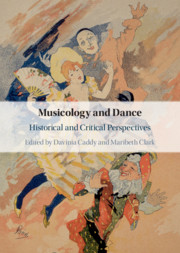Book contents
- Musicology and Dance
- Musicology and Dance
- Copyright page
- Contents
- Figures
- Tables
- Music Examples
- Contributors
- Acknowledgements
- Introduction
- Part I Conceptual Studies
- Chapter 1 Bach and the Dance of Humankind
- Chapter 2 Dance as ‘Other’: Contrasting Modes of Musical Representation
- Chapter 3 Thinking on Our Feet: A Somatic Enquiry into a Haydn Minuet
- Chapter 4 Making Moves in Reception Studies: Music, Listening and Loie Fuller
- Part II Case Histories
- Part III Critical Readings
- Select Bibliography
- Index
Chapter 2 - Dance as ‘Other’: Contrasting Modes of Musical Representation
from Part I - Conceptual Studies
Published online by Cambridge University Press: 09 September 2020
- Musicology and Dance
- Musicology and Dance
- Copyright page
- Contents
- Figures
- Tables
- Music Examples
- Contributors
- Acknowledgements
- Introduction
- Part I Conceptual Studies
- Chapter 1 Bach and the Dance of Humankind
- Chapter 2 Dance as ‘Other’: Contrasting Modes of Musical Representation
- Chapter 3 Thinking on Our Feet: A Somatic Enquiry into a Haydn Minuet
- Chapter 4 Making Moves in Reception Studies: Music, Listening and Loie Fuller
- Part II Case Histories
- Part III Critical Readings
- Select Bibliography
- Index
Summary
With reference to an impressive range of examples from across European genres and repertoires, Suzanne Aspden illustrates ways in which dance has been embodied within Western ‘art’ music. Exploding the myth of ‘the music itself’, Aspden notes a significant historical swing in both aesthetics and compositional practice during the nineteenth century, as musical representations of dance gradually morphed from being overtly ornamental and elaborate to more straightforwardly transparent in their dependence upon a long-established vocabulary of musical topics. While tracing this historical shift, Aspden offers a nuanced critical commentary on some of the shop-worn assumptions about dance that have marked traditional textbook histories of European music, especially negative associations between dance and the anti-intellectual, the ‘low’, the feminine and the ‘Other’.
Keywords
- Type
- Chapter
- Information
- Musicology and DanceHistorical and Critical Perspectives, pp. 49 - 70Publisher: Cambridge University PressPrint publication year: 2020

